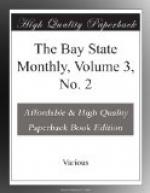The lyre is one of the oldest of musical instruments. Its invention is ascribed to a god. Its Saxon name is harp. It was the favorite instrument of the ancient Hebrews, as well as of the Greeks. The Saxons, Britons and Danes regarded it with veneration, and protected by legal enactments those who played upon it. Their persons were esteemed inviolable and secured from injuries by heavy penalities. By the laws of Wales, slaves were forbidden to practice upon it; and no creditor could seize the harp of his debtor. That minstrels were a privileged class is manifested from king Alfred’s penetrating the Danish camp (878) disguised as a harper. Sixty years after a Danish king visited King Athelstan’s camp in the same disguise. It was also said of Aldhelm, one of the leading scholars of the eighth century: “He was an excellent harper, a most eloquent Saxon and Latin poet, a most expert chanter, or a singer, a doctor egregius, and admirably versed in scriptures and liberal sciences.” The minstrel was a regular and stated officer of the Anglo-Saxon kings. Poetry is always the earliest form of literature; song the earliest form of poetry. The Muse adapts her lessons to the nation’s infancy and adds the charm of melody to verse. No nation is destitute of lyric poetry. Even the North American Indians have their war songs, though their individual worship of their gods has prevented the creation of any national poetry for associated worship. The Scandinavians have but one term for the poet and the singer. The Northern scald invented and recited his own songs and epics. In other countries the poet and minstrel performed separate duties. “The Minstrels,” says Bishop Percy, “were an order of men in the Middle Ages who subsisted by the arts of poetry and music, and sang to the harp verses composed by themselves and others. They appear to have accompanied their songs with mimicry and action. They are called in Latin of the day histriones, Mimi and Scurrae. Such arts rendered them exceedingly popular in this and in neighboring countries, where no high scene of festivity was esteemed complete that was not set off with the exercise of their talents; and where so long as the spirit of chivalry existed, they were protected and caressed, because their songs tended to do honor to the ruling passion of the times, and to encourage and foment a martial spirit.”




